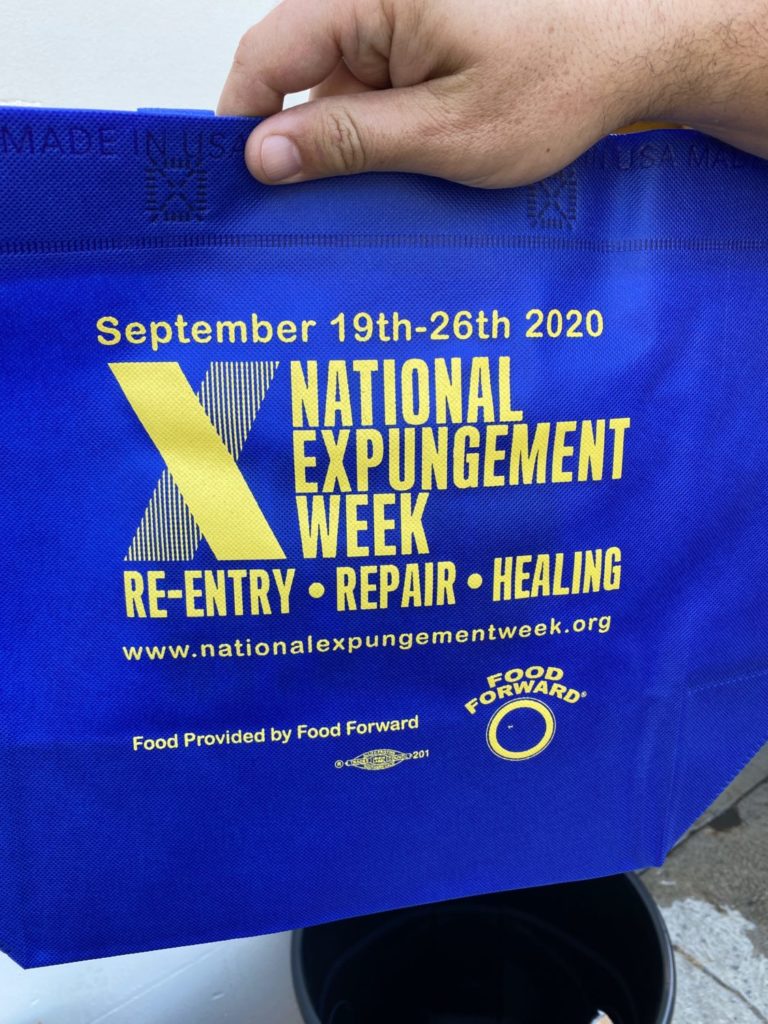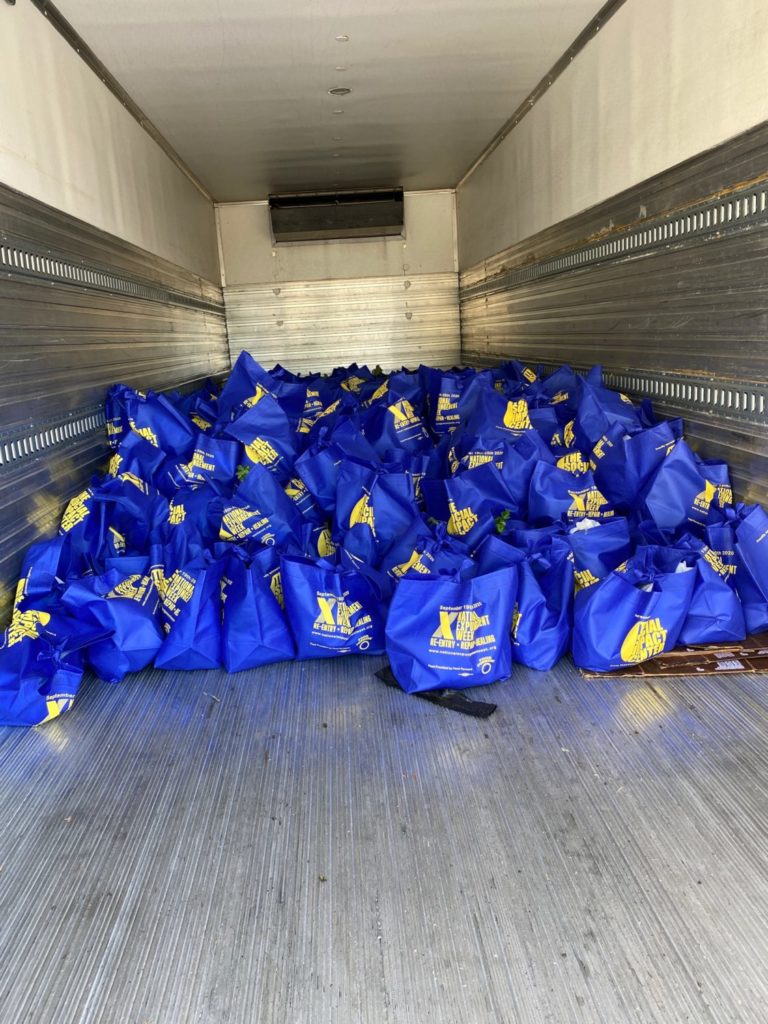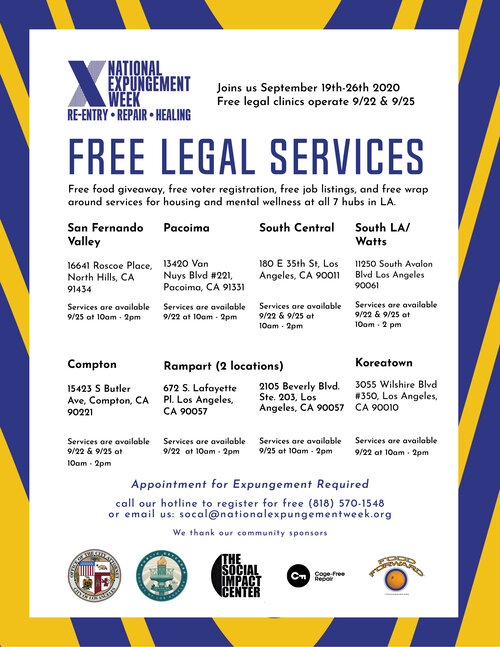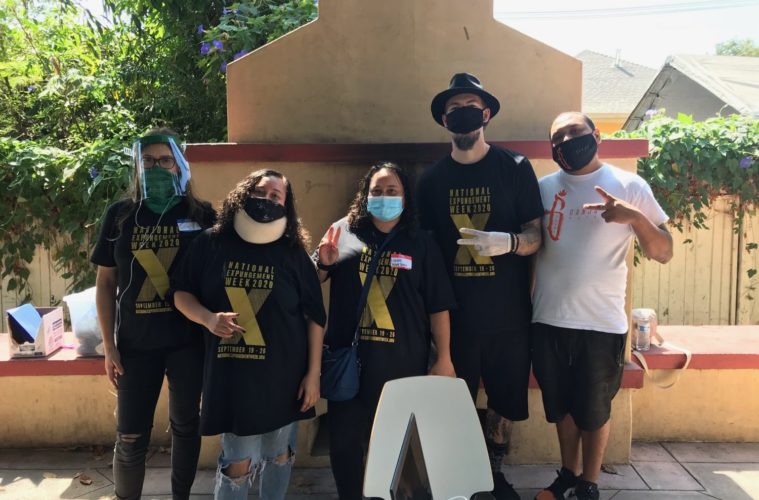As National Expungement Week celebrates its third anniversary, righting the wrongs of the past has never been more entrenched in the cannabis legalization debate than it is right now.
The third edition of National Expungement Week (N.E.W.) continues the event’s mission of spreading awareness across 77 million Americans with criminal records that in some circumstances there is legal relief. Especially in regards to people with old pot possession records holding them back in life. This year the event takes place from September 19-26, 2020.
In addition to efforts locally in Los Angeles and California, N.E.W. events will be taking place in Colorado, the District of Columbia, Florida, Hawaii, Illinois, Kentucky, Massachusetts, Missouri, New York, New Jersey, Oregon, Pennsylvania, South Carolina and Washington.
“Our year-round work never stops, and we are determined to use this week to inspire communities to take action, clear records, and restore the rights of some of the 77 million justice-impacted people in the U.S.,” said LaTorie Marshall, the founder of National Expungement Week.
This year will include the record-clearing services, legal advice and education elements known as hallmarks of the week. But keep an eye out as organizers continue to expand the mission to restore rights and quality of life to individuals and communities in new ways. This includes key service areas exposed by the ongoing pandemic. This year will also include voting rights, housing and food insecurity as a larger part of the discussion. These things all fall under the impact umbrella of a conviction. Whether it be disenfranchisement or keeping a stable enough income to have food and a roof over your head.
The local organizers of N.E.W. said there is a lot going on in L.A. and every one of the six hubs will be giving out 100-150 bags of food. There will also be voter registration, and wraparound services pertaining to housing insecurity and mental wellness.


“Our week of action has been one for the books here in Los Angeles,” N.E.W. L.A. Organizer Felicia Carbajal told L.A. Weekly.
Carbajal noted day one alone provided volunteers with an opportunity to share food with over 600 families and register 100 new voters. While at the core of the week’s theme, 60 people were provided with legal relief that day.
“We are showing our city and country what can be achieved when a dedicated group of people comes together for marginalized communities,” Carbajal said. “Our dedicated volunteers, the legal professionals from the County Public Defender’s office and the L.A. City Attorney’s office, and the attendees have shared overwhelmingly that everyone’s heart is full and hopeful for the future.”
While many people have already received legal support this week, the big expungement clinic taking place on Friday, Sept. 25 at the Big House in South Central will feature State Senator Holly Mitchell. Mitchell will be there starting at noon to talk about second chances in relation to the work of N.E.W. and those seeking legal relief.
In recent years here in Los Angeles, N.E.W. has also been about celebration. A big part of that resulting from the L.A. District Attorney’s participation in Code for America’s Five-County Clear My Record Pilot.
In February, the DA asked a Los Angeles Superior Court judge to dismiss 62,000 felony cannabis convictions. The cases included in the request dated back nearly 60 years. The DA also asked to dismiss about 4,000 misdemeanor cannabis possession cases. The cases were geographically spread across the county with former pot offenders in Los Angeles, Long Beach, Torrance, Pasadena, Inglewood, Burbank, Santa Monica, Hawthorne, Redondo Beach and Hermosa Beach all seeing relief.
“The dismissal of tens of thousands of old cannabis-related convictions in Los Angeles County will bring much-needed relief to communities of color that disproportionately suffered the unjust consequences of our nation’s drug laws,” Los Angeles County District Attorney Jackie Lacey said at the time. “I am privileged to be part of a system dedicated to finding innovative solutions and implementing meaningful criminal justice reform that gives all people the support they need to build the life they deserve.”

We reached out to Code for America to get their take on all the hype around expungements these days. For the coders, it originally started with an app that’s helped 20,000 people to this day. But two years into the Clear My Record program, the team realized it was obvious automation was the way to go if they wanted to help as many people as possible – even the ones that didn’t know they could get help.
“There was this gap between the people who could get relief, and then the people who actually weren’t getting relief,” Alia Toran-Burrell, Clear My Record’s Associate Program Director, told L.A. Weekly. “Fast forward to 2018, and Prop. 64 had passed already, legalizing marijuana. All of these people with marijuana convictions could have gotten their marijuana convictions cleared through that law but they had to go through the petition-based process. So they had to go to court, they had to file paperwork, they had to take time off of work, spend money, all of these things that are total barriers for people to actually do that.”
Code For America got into automation in 2018 when San Francisco’s DA announced they were going to take a proactive approach in clearing records. From there, they started the pilot program with L.A. onboard.
“So we developed technology that helps those district attorneys review eligible convictions automatically. Instead of a district attorney having to go through record by record, our technology could read bulk information and produce eligibility determinations in just a matter of seconds,” Toran-Burrell said. “Our technology can read about 10,000 records in just a couple seconds. It’s vastly faster, meaning that people can get relief faster.”
Now, six months after initially crossing the pilot program finish line in L.A., Toran-Burrell estimated their technology helped identify for reduction or dismissal of about 66,000 convictions total in L.A. County, 144,000 in the state. Across the state, it’s up to 220,000 convictions in total.
“There’s a ton of momentum across the country for record clearance and Code for America is part of a national bipartisan coalition called the clean slate initiative that is working to advance automatic record clearance policies across the country,” Toran-Burrell said.
The biggest thing that Code for America is currently exploring is how they ensure that people whose records have been cleared through automatic record clearance know that their records have been cleared.
“Right? Because in an automatic system, it happens on the state level but there’s not necessarily a way to get information back to people,” Toran-Burrell said. “And so that impact of moving on with their lives and making different choices is not necessarily there. And so we are trying to figure out the best ways to actually notify people that their conviction has been changed and give people the information they need to make different decisions.”
It’s not just a huge issue in California, but also nationwide.
“How do we ensure that impact is delivered when the implementation is complete? And then again I would just emphasize that in California these marijuana convictions are not fully clear for people until the courts in the state clear convictions,” Toran-Burrell said. “So while it’s exciting that we are in the first stages of this we need to ensure that the courts statewide prioritize clearing the convictions, as soon as possible.”
Advertising disclosure: We may receive compensation for some of the links in our stories. Thank you for supporting LA Weekly and our advertisers.

